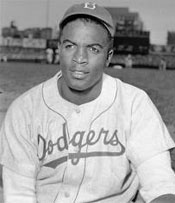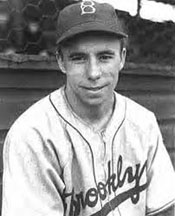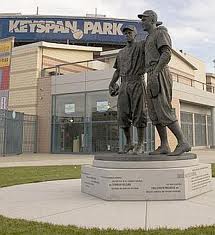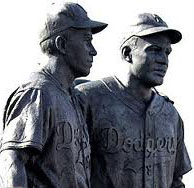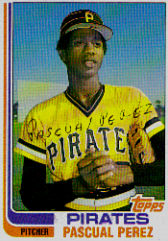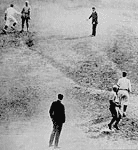Bits of Baseball Lore – II
Nice Story But It Didn't Happen - At Least Not Quite That Way
In Jackie Robinson's ground-breaking rookie season of
1947, the Brooklyn Dodgers started their first western
trip of the season in Cincinnati on May 13.
- The crowd of 27,164, quite large for a week night, included
a huge number of African-American fans (perhaps 50%), far more than
the Reds normally drew.
- The second-place Dodgers, 1 1/2 games out of first,
did not play well in the 7-5 defeat. Jackie walked,
singled, scored a run, and drove in a run.
- Brooklyn
also lost the next day to Ewell Blackwell, 2-0, before
only 6,688 at Crosley Field.
According to a story that has been perpetuated for over 70 years, Robinson
took more abuse from the white fans and players in Cincinnati than he
had heard in any city so far that season.
- Pee Wee Reese, the "Kentucky Colonel" from Louisville, 100 miles from Cincinnati, was more popular in Cincinnati than most of the Reds players. At one point in the game, Pee Wee purportedly left his SS position and walked over to Robinson, who played 1B. The Dodger captain put his arm around Jackie's shoulder and spoke words of encouragement, thereby hushing the crowd.
- Reese's action has been praised through the decades as a turning point in Jackie's acceptance in the league. A bronze statue of the two men embracing was dedicated in 2005 at Keystone Park, home of the minor league Brooklyn Cyclones.
The only problem with the story is that the incident probably did not happen.
- First of all, accounts of the game uniformly report that the Cincinnati
fans, white as well as black, warmly applauded Robinson,
to the point where the Reds
players joked in their dugout that he could hit a foul ball and receive
cheers.
- In his weekly newspaper column, Jackie called
his visit to Crosley Field "a nice experience." The New
York Post called Robinson "the toast of the
town" after that game.
- Also,
no account in the days and weeks following the game mentions the Reese-Robinson
embrace, and no photos of any such incident have ever been found.
- Commissioner "Happy" Chandler, a strong supporter of Robinson,
attended the game and never mentioned any rude behavior by the Cincinnati
fans nor any supportive action by Reese, his fellow
Kentuckian.
At
the end of the season, Robinson wrote his account of
the season with writer Wendell Smith but made no mention
of such an incident.
- He did not single out Reese as
going out of his way to make him feel welcome.
- In fact, both Branch
Rickey, the Dodger GM, and Jackie
cited Eddie Stanky as his most important backer in
accounts written shortly after the season.
So
the bottom line is that Reese putting his arm around
Jackie to quiet the crowd makes a touching story, but
it almost certainly did not happen.
However, read the update below. |
|
UPDATE
The following passage comes from the 1976 book The Lords of Baseball by Harold Parrott, the Dodgers' traveling secretary and publicist during the Rickey years.
The news that Robinson was "making it" spread fast, and the little ballpark in Cincinnati, Crosley Field, ... was jammed with whites who had come to see if this Nigra could really do it, as well as blacks there to cheer their new trailblazer on. ...
There had been a sack of mail for Robinson at our hotel, and I went through it the morning we hit town. Three of the letters contained threats that Jack would be shot in his tracks if he dared to take the field. I handed these over to the FBI, which got pretty excited about it and searched every building that overlooked the ballpark that would afford a sniper a shot at Number 42.
Usually I didn't show Robbie the hate mail ... But this time I had to warn him, and I could see he was frightened. I passed the word to Pee Wee, who was the captain, and a couple of the other solid players on the club. I wasn't sure what was going to happen in the Queen City, right across the river from Kentucky. But all the folk from the hill and still country were flocking into town for the big event.
Reese himself was in a tough spot. He had been born and raised in Louisville, and his lovely mom had always brought fried chicken and chocolate cake to Cincinnati for the boys on the team. Pee Wee's two sisters came to the games a lot, and I seated them in the club box whenever possible. Now I knew very well the kind of flak they were catching from the crackpots who thought their brother should refuse to put on the same uniform a "Nigra" was wearing. ...
Robinson had been pretty much of a loner so far. ... Not that he was aloof. He was just waiting to be asked in, and he hadn't really "made the team" yet. A lot of the players, Reese and Hodges particularly, respected his ability and what he was doing. They were polite and cordial, but definitely not pally with him.
The record of our National Anthem they played that day had the sound of bombs bursting in air, and the thought occurred to me that that precise moment would have been the ideal cover for gunfire, if someone were indeed going to take a shot at Robinson. But we got through that all right, and through the top of the first, too, in which Jackie was the third out. The crowd was still buzzing from its first look at the black man in action when our team ran onto the field from the first-base dugout. Reese stopped at first for a few last-second words with Robbie. As he hid his mouth behind his gloved left hand the way ballplayers talk, Pee Wee put his right arm around Robinson's shoulders.
The silence that hit those stands where the fans had been buzzing a second before was truly deafening. Their boy had put his arm around the Nigra!
Robbie told me later that that gesture by Reese was the first big breakthrough and meant as much to him as any single bit of approval or acclaim that were to come to him in the ten years that followed.
Where'd Everybody Go?
|
|
One of the strangest baseball fights ever took place on August 25, 1981, at Pittsburgh's Three Rivers Stadium.
- In the sixth inning, Pirate P Pascual Perez hit Bill Russell and Dusty Baker of the Los Angeles Dodgers with "suspicious pitches."
- Pugnacious Dodger OF Reggie Smith in the dugout challenged Perez to a fight.
- Pascual took the dare and entered the tunnel behind home plate with Smith followed by the two teams, the umpires, and photographers.
- Perez had picked up a bat on his way to the tunnel and, with "a crazed expression on his face," threatened Smith with the Louisville Slugger until teammate Bill Robinson restrained him.
- After a few minutes during which the crowd of 16,770 stared at an empty field and wondered what was going in, the fracas broke up, and the game resumed.
- "There wasn't enough room to swing," lamented Dodger outfielder Rick Monday. "We just had four feet of room to dance in."
- Surprisingly, no one was ejected. Umpire Lee Weyer said afterwards: "I've never seen anything like that before in 25 years in baseball."
The Dodgers won 9-7 in 11 innings but afterwards most of the players just wanted to talk about the near-brawl.
Reference: Field of Screams, Richard Scheinin |
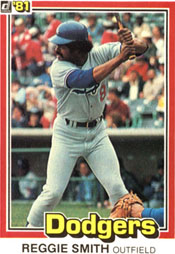

Rick Monday
|
Strange Steal of Home
August 8, 1903: As he often did, "Iron Man" Joe McGinnity of the New York Giants was pitching the second game of a doubleheader after winning the opener, 6-1. The opponent was the Brooklyn Superbas. The record overflow crowd of 31,647 assembled at the Polo Grounds saw an out of the ordinary steal of home.
- In the third inning, McGinnity singled. When he tried to steal second, the throw from C Fred Jacklitsch went wild. The lone umpire, Tim Hurst, awarded McGinnity third because of interference by a Dodger fielder (2B or SS presumably) as Joe tried to advance.
- "More than half of the Brooklyn team left their fielding positions and gathered around" Hurst to protest the call. P [Henry] Schmidt walked away from his box, leaving the ball behind. Standing at third "rubbing a supposedly bruised leg," McGinnity, "cleverly coached by [Manager and 3B coach John] McGraw, took advantage of this opportunity and stole home."
- "The Brooklyn players looked sheepishly at each other, and then protested more vigorously, while the crowd cheered derisively. Schmidt became more boisterous than the others and was ordered out of the game. ... [Sammy] Strang, who was the last man to handle the ball before McGinnity stole home, was called to the bench by Manager [Ned] Hanlon and [Dutch] Jordan covered 3B for Brooklyn during the remainder of the game." One account says that Schmidt "was so angry he threw the ball out of the park," which caused his banishment by Hurst.
- Superba skipper Ned Hanlon had managed the Baltimore Orioles teams of the 1890s who set the pace for crafty and often illegal play. So he was undoubtedly chagrined that his players had allowed McGraw, who had played on those teams for Hanlon, to put one over on them. This may be why he pulled Strang, probably because he should have called time before returning the ball to the mound.
The Giants swept the doubleheader 5-4, scoring two in the bottom of the ninth. So for the second Sunday in a row, Iron Man won both games of a doubleheader.
Reference: "McGinnity Pitched in the Two Games New Yorks Won from Brooklyn,"
The New York Times, August 9, 1903 |
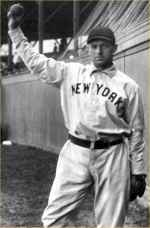
Joe McGinnity
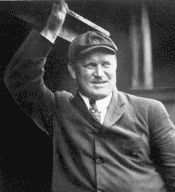
Tim Hurst
|
"Dilatory Tactics Lose for Mackmen"
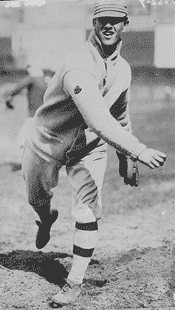 Joe Bush
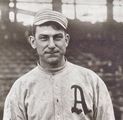
Napoleon Lajoie
|
That was the The New York Times headline on July 15, 1915, over a story of the Chicago White Sox victory over the Philadelphia Athletics the previous day in The Windy City.
With rain in the forecast, the game started five minutes early.
- "Chicago was leading by two runs when the roar of thunder inspired the visitors to use almost every means known to baseball to delay the game before the legal number of innings [five] were played."
- "In the fourth [with the White Sox ahead 4-2], Pitcher [Joe] Bush did not attempt to put a ball over the plate, yet the local batsmen swung in order to hurry the game." Unsuccessful in trying to walk batters, Bush resorted to a different tactic.
- "[White Sox P Red] Faber was hit by one of these wild throws and jaunted to first. He continued around the bases, and scored the run which in the end proved to be the winning tally. He was credited with a steal of second, third and home." In other words, Faber was trying to get thrown out stealing, but the A's made no effort to retire him.
- "A few moments later [SS Buck] Weaver dropped a Texas leaguer into right and almost reached third before he was thrown out, [RF Eddie] Murphy, [2B Nap] Lajoie, [SS Larry] Kopf and [3B Wally] Schang handling the ball before he was retired, when he could easily have been put out by Lajoie."
- "When it became evident that the umpires [R. J. Wallace and Tom Connolly] were insistent upon playing, the visitors braced, but could not overtake the lead which they had presented to Chicago."
The rain never materialized, and Chicago won 6-4 in 1:40.
|
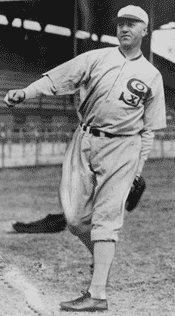
Red Faber
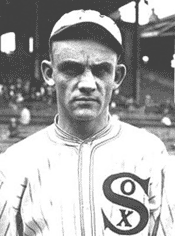
Buck Weaver
|
Strange Injuries – I
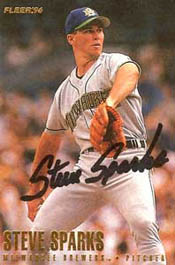
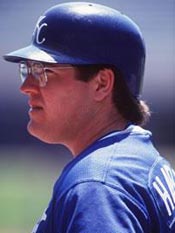
Bob Hamelin
|
This occasional feature presents a collection of bizarre ways that players have gotten injured.
- Steve Sparks was having a fine spring training with the Milwaukee Brewers in 1994. The knuckleballer was on his way to making the big show. However, an injury postponed his ML debut. A group of motivational speakers who called themselves Radical Reality gave a presentation to the team in which they bent iron bars with their hands, ripped telephone books in half, and inflated hot-water bottles like balloons until they burst. The next day, Sparks and some teammates decided to try the phone book feat. Steve had the huge Phoenix directory almost torn in half when he dislocated his left shoulder. After being out several weeks, he was returned to the AAA New Orleans Zephyrs for one more season. His "feat" was reported in articles in newspapers and Sports Illustrated, labeling him in the public mind for the manner in which he injured himself. "To this day, going into Boston and New York, ... I am constantly asked to sign telephone books there," Sparks said years later.
- That same year (1994), another rookie, Bob Hamelin of the Kansas City Royals, almost jeopardized his spot on the roster as well. Expected to replace George Brett as the DH, Bob tore a muscle in a Las Vegas arm-wrestling tournament in January. "It seemed like a fun and easygoing type of thing, and it was pretty much not that intense," explained Hamelin when he reported to spring training. He was paid $200 to participate in the ESPN event. Bob won both of his matches but tore the flexor tendon in his right elbow in the second round. "It was embarrassing. It was stupid. It was too close to spring, especially going in with a chance to start. I've had enough injuries not to do it off the field. I'm sure it [no arm wrestling] will be in my next [contract] clause." Hamelin said the injury sounded worse than it was. "It's fine. It's not hindered my swing." And, as DH, he wouldn't have to throw. Fortunately, his optimism about his healing was justified as he earned Rookie of the Year honors by hitting .282 with 24 HR and 65 RBI.
More of these in the future ...
|
|
Unassisted Triple Play
October 10, 1920: Fifth game of the World Series between the Cleveland Indians and the Brooklyn Robins (eventually called the Dodgers).
The best-of-nine Series is tied two games apiece. The Indians lead 7-0 in the top of the fifth before 26,884 fans at League Park in Cleveland. 2B Pete Kilduff leads off with a single off Jim Bagby, and C Otto Miller follows
suit to put runners on first and second. P Clarence Mitchell,
who took over in the fourth for starter Burleigh Grimes, smacks a line drive up the middle that is snared by Indian second baseman Bill Wambsganss, who steps on second to retire Kilduff and tags Miller running from first. Wambsganss thereby records what still stands as the only unassisted triple play in World Series history.
Unassisted triple plays are more rare than perfect games and hitting four
HRs in a game. From June 1927 to September 1992, there was only one unassisted triple play in the major leagues (in 1968). |
|
The Indians won the pivotal fifth game 8-1. They then took the sixth game 1-0 and closed the Series with another shutout victory, 3-0, in Game 7. To reduce travel, the first three games had been played at Ebbets Field in Brooklyn. The next four were in Cleveland. If games eight or nine had been necessary, they would have been in Brooklyn.
After the Series, "Wamby" was presented a medal
by the Indians to commemorate his triple play. However, in April 1921, while traveling northward with his team after spring training, he lost the medal on the train. |
|
Earthquake Opened the Door for Doerr
In 1934 Odie Brannon played 2B for the Hollywood
Stars of the Pacific Coast League.
- One day, an earthquake toppled a telephone pole which brushed Odie. Though not seriously injured, he played tentatively as if expecting another tremor. Stars Manager Oscar Vitt (who ran the Indians
a few years later) asked his boss to sign a young player who was an American Legion star in the Los Angeles area. So the boy's father, who coached the American Legion team (which also boasted future major leaguers Mickey Owen and Steve Mesner), was contacted. His older son already played pro ball, but he refused to allow the younger boy to follow suit. After all, he was only 16! Vitt persisted until the father relented, agreeing to a guaranteed two-year contract at $200 a month. Within three years, Bobby Doerr was a .342 hitter for San Diego, which was the transplanted home of the Stars.
Such production attracted the attention of Red Sox General Manager Eddie Collins,
a Hall of Fame second basemen himself. Eddie traveled to the West Coast to scout young Bobby.
Collins overlooked Doerr's erratic fielding in the first game, attributing it to nervousness because
he knew he was being scouted. By the time Collins returned East, he had signed Doerr to a contract.
Joining Boston for the 1937 season, Bobby was beaned in an exhibition
game and played in only 55 games. However, he was a mainstay at 2B from 1938 until his retirement in 1951.
- The Sporting News named him the American League Player of the Year for 1944.
- In his only World Series in 1946, Bobby hit .409 in the seven-game loss to the Cardinals.
- Doerr broke up not one but two Bob Feller no-hitters
(May 25, 1939 and July 31, 1946) with second-inning singles. Doerr downplayed his 1939 hit: "I hit
the ball off my ear and broke the bat."
- When Joe McCarthy took over the Red Sox after managing the Yankees
for many years, he changed his mind about the best second baseman/team player he had seen from Joe Gordon
to Doerr.
- An interesting fact is that Bobby Doerr was
never ejected from a game in 15 years in the major leagues.
Reference:
Baseball's Hall of Fame Cooperstown, Where the Legends Live
Forever,
Lowell Reidenbaugh
|
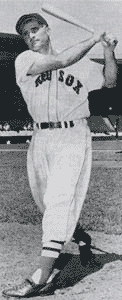
Bobby Doerr
|
Rex Hudler put together a 13-year career in the major leagues with six different clubs. Known for his hustle and ability to play any position, " Rex the Wonder Dog" hit .261 with 56 HRs.
By contrast, during his 21-year ML career with the Baltimore Orioles, Cal Ripken broke one of the most famous records in history, Lou Gehrig's 2,130 consecutive games played. Cal was inducted into the Hall of Fame in his first year of eligibility in 2007.
Why are these two players linked together?
- Hudler was chosen in the first round of the 1978 draft by the New York Yankees. The Orioles didn't select Ripken until round two. When Rex played for the Yankees and then, briefly, for the Orioles, he made sure to rub it in with Cal that he had been picked ahead of him. But Hudler confesses he learned much from Cal about infield play, especially during the few games they played together as a double play combo.
- Cal's best advice to Rex affected his life off the field. During spring training in Florida in 1987, Ripken coached Rex on how to pop the question to his girlfriend Jennifer. At Cal's suggestion, Hudler chartered a sailboat out of Key Biscayne. Then he waited until sunset to ask Jennifer to marry him. She accepted, and they were wed the following year.
- But the connection between Cal and Rex didn't end there. On the night Cal broke Gehrig's record, Rex played 2B for the opponent, the California Angels. When Rex returned to the clubhouse after the game, he found a bat in his locker. On it Cal had written:
Rex, you know it's been a long time since we broke in, your going ahead of me in the draft, until this date. Right now I'm feeling like you when you strike out with the bases loaded: VISIBLY SHAKEN – Cal Ripken, Jr., 9/6/95
Reference: Amazing But True Sports Stories, Steve Riach |
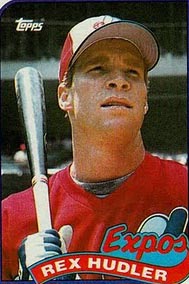 Rex Hudler
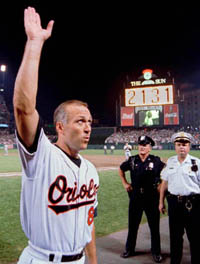
|
Don't Let the Fire Stop You
This incident took place on May 15, 1894, in a game between the Baltimore Orioles and the Boston Beaneaters at South End Grounds in Boston.
- Tommy Tucker of the home team had built a reputation as a bench jockey and comedian. He was particularly obnoxious when coaching 1B. He would not only relay signals to runners but also do everything in his power to distract P. His nickname of "Foghorn" tells you that he was quite an agitator. As a result, he was marked man for most clubs and particularly the Baltimoreans, who had a dugout full of agitators led by 3B John McGraw, future Hall of Fame manager of the New York Giants.
- In the home half of the third, Boston led 5-3. Let the Boston Daily Globe reporter pick it up from there.
The game was full of excitement, and the dirty playing of McGraw of Baltimore created a great deal of ill-feeling because of its deliberateness.
In the third inning Tucker was on third
and Ganzel started for second; the ball was
thrown to third and Tucker slid to the bag
and McGraw deliberately kicked Tucker
in the face. Such conduct should be stopped
at once and forever, as it does not belong to the sport at all.
- McGraw and Tucker began fighting. But fans egging on the combatants by littering the field with fruit, trash and beer bottles were soon distracted by a fire that broke out in the RF stands. According to the Daily Globe,
One of the spectators ... dropped a lighted cigarette through the seats on the lower end of the right field side. It fell among some inflammable rubbish [another account says lumber], and from an incipient blaze which it ignited spread the most disastrous fire Boston has had since the burning of the Ames building a year ago last March.
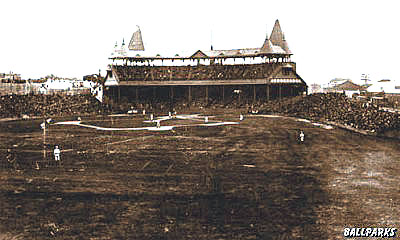
- Fanned by a "brisk breeze," the fire destroyed the bleachers, the $75,000 grandstand, and over 170 buildings covering 12 acres - an estimated $300,000 worth of damage of which insurance covered only half. Fortunately, there were no reported fatalities.
- The following notice appeared in the Boston Daily Globe on May 17.
The people who went to see the ball game at the South End Grounds Tuesday didn't have their admission money refunded at the gates, although they didn't see a game. The gatekeeper was therwise engaged, and, besides, the spectators had more than a dollar's worth of show.
- The Baltimore-Boston series continued the day after the fire at the Congress Street ground while the Boston club made plans to rebuild the grandstand at the South End Grounds.
Reference: Field of Screams, Richard Scheinin |
 Tommy "Foghorn" Tucker
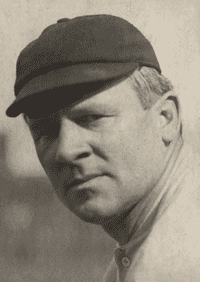
John McGraw
|
|
CONTENTS
Nice Story But It Didn't Happen
Where'd Everybody Go?
Strange Steal of Home
"Dilatory Tactics Lose for Mackmen"
Strange Injuries - I
Unassisted Triple Play
Earthquake Opened the Door for Doerr
Cal and Rex
Don't Let the Fire Stop You
Baseball Lore –
I
Baseball Lore – III
Baseball
Lore – IV
Baseball
Lore – V
Baseball
Lore – VI
Baseball
Lore – VII
Baseball
Lore – VIII
Baseball
Lore – IX
Baseball
Lore – X
Baseball
Page
Golden Rankings Home
Top of Page
|


